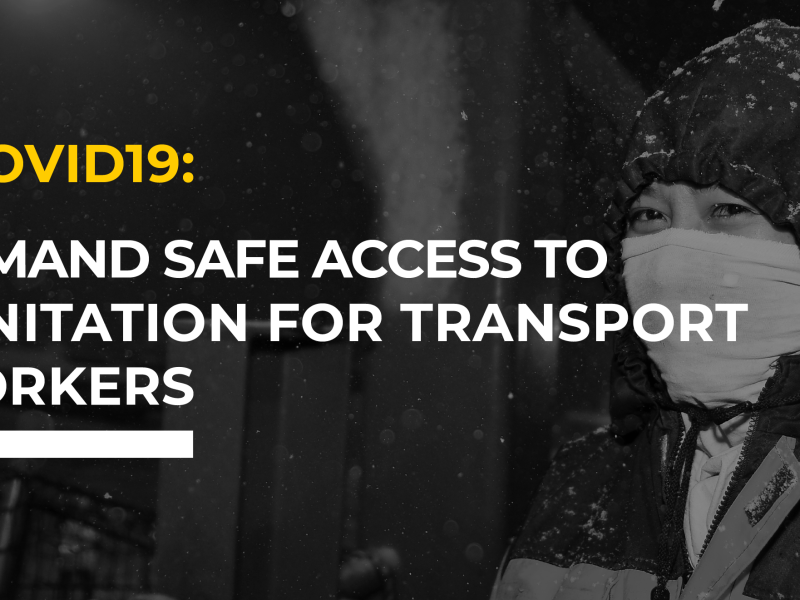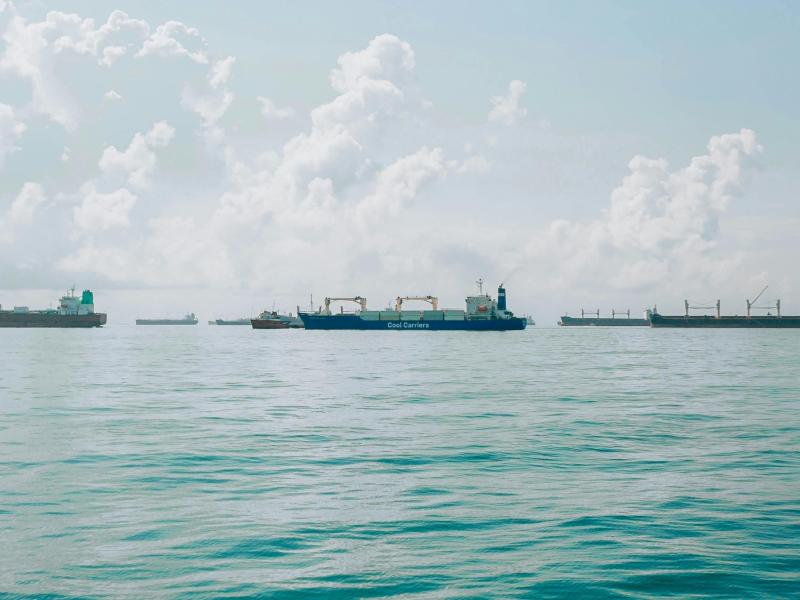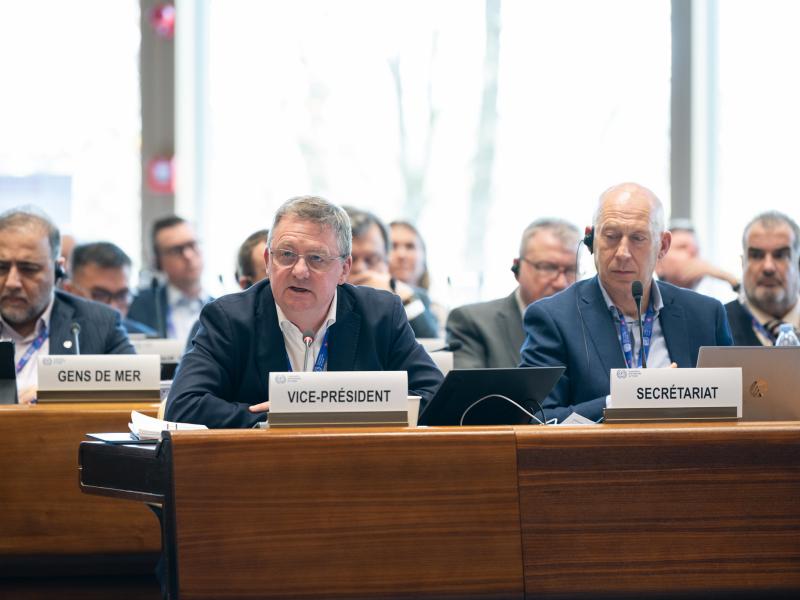Transport workers together for a gender equal new normal
The transport industry is highly gendered, and whilst all transport workers are being severely impacted by the Covid-19 pandemic, there will be specific and additional impacts for women transport workers.
As the International Labour Organization (ILO) has recognised, the challenges arising out of this crisis have the potential to exacerbate existing inequalities. To avoid this, it is imperative that the transport industry – including employers, governments, investors and unions – action a gender responsive approach to ensure that inequalities are not reproduced, perpetuated or intensified.
The ITF has identified key demands for employers, governments and investors for women transport workers in the Covid-19 response and recovery:
- Women on all decision-making bodies
- Income and social protection
- Access to sanitation and appropriate PPE
- Secure work
- Care before profit
- End violence and harassment against women
- New technology to benefit women workers
- Gender impact assessments
- Gender-responsive economic stimulus
These priority areas must be negotiated with unions, with women’s participation and with all actors using their leverage to ensure the same high standards of protection throughout supply chains.
Demanding a gender responsive approach will benefit everybody in the struggle for decent work.
Women transport workers are a proud part of the workforce which is the lifeblood of a global economy linking supply chains and keeping the world moving.
They are the drivers, conductors, ticket sellers, cabin crew, pilots, dockworkers and seafarers providing critical services, as the global community responds to the pandemic. But they are also the less visible workers keeping transport systems running, through vital work such as maintenance, security, cleaning, and administration services.
As a result of the gender-segregated nature of the transport industry, women are concentrated on the frontlines of this pandemic in customer-facing and cleaning roles with a higher risk of infection. This increased exposure, combined with a lack of adequate and appropriate personal protective equipment (PPE) and the fact that women also make up the majority of precarious workers, means that women transport workers will disproportionately suffer the negative impacts of the coronavirus crisis.
Already we have seen a significant number of women transport workers severely affected, particularly public transport workers and those working in the cruise industry, in aviation, and informal transport workers.
ILO Recommendation 205, demands a gender perspective in all crisis response, gender-inclusive social dialogue, and gender equality and the empowerment of women and girls for enabling recovery.
It is our responsibility as trade unions to ensure that women are protected during this crisis, and their rights are strengthened and reinforced.
After Covid-19, we cannot go back to a ‘normal’ which for many women transport workers means being overrepresented in precarious employment without social protections, underrepresented in leadership and decision-making, facing violence at work and home, and sanitation indignity. This is not normal.
Instead, we have an opportunity to ensure that as we emerge from this crisis, that there is a ‘gender equal new normal’ that guarantees good jobs for all workers.
PRIORITY AREAS TO PROTECT AND ENHANCE WOMEN TRANSPORT WORKERS’ RIGHTS
Women on all decision-making bodies
Without women on decision-making bodies, analysis, strategy and policy will not adequately address the issues that women face.
ITF calls on employers and governments to:
- Ensure that women are always included on all decision-making bodies.
- Ensure gender parity in all decision-making related to monitoring and collecting information and feeding back into policy advice processes as outlined in the UN Women, ILO, Unicef recommendations.
Income and social protection
Income support for all women workers, including for migrant, precarious, informal workers and those in non-standard forms of employment (such as part-time, outsourced, ‘gig’ work) is essential.
Employers and governments must provide:
- Income protection for all workers who lose their jobs or are temporarily affected by Covid-19.
- Paid leave for any worker who is directly or indirectly impacted by Covid-19 due to infection, isolation or family or childcare obligations including those in non-standard forms of employment.
- Adequate measures for protection from infection including adjustment of work schedules with no loss of earnings for vulnerable and at-risk workers (and members of family) including pregnant workers and new mothers.
- Expansive coverage of unemployment benefits, relief packages, health insurance and other social protections that include informal workers and those in non-standard forms of employment.
- International cooperation for the urgent establishment of a Universal Social Protection fund to provide partial support for low to middle-income countries’ social protection systems and ensure social protection floors for the 28 poorest nations.
Access to sanitation and appropriate PPE
Access to sanitation facilities, clean toilets, sanitisers and clean drinkable water, already a major issue for transport workers, is critical in the response to Covid-19.
Employers and governments must ensure:
- Safe access to decent sanitation facilities and ample breaks, without fear of penalty, particularly given the shutdown of many public spaces often used by transport workers.
- Strict and regular cleaning and sanitation procedures in workplaces, which are inclusive and take account of the specific needs of transport workers such as menstruation, pregnancy, disability, menopause and pre-existing health conditions.
Women must also be involved in developing and implementing preventative health and safety measures, including:
- PPE and uniforms which are suitable for women’s bodies.
- Provision of PPE including masks, gloves, hand-sanitisers and/or water and soap for all workers whose tasks require them.
- Working conditions that minimise transmission and facilitate social distancing with a gender inclusive and responsive approach.
Secure work
Overrepresentation in precarious informal work and non-standard forms of employment means women are more vulnerable to layoffs and loss of earnings without any form of income protection. Informal transport workers have no choice but to continue to work in order to earn a daily wage, despite the risk to their health and repercussions from the authorities. Migrant women also have no work in lockdown situations in many countries.
Without strong protections and secure conditions of employment negotiated with unions, many women may find themselves pushed out of the industry.
The ITF calls on employers and governments to:
- Urgently facilitate the transition of workers from the informal to the formal economy in line with ILO Recommendation 204.
- Ensure universal access to income protections, healthcare benefits and leave including for sickness, pregnancy and caring responsibilities.
- Re-skill women transport workers into new (formal) occupations in the industry.
Care before profit
There are many aspects of this crisis that women will face specifically and/or disproportionately, for example pregnancy and maternity risks as well as unpaid care responsibilities.
The ITF calls on employers and governments to:
- Recognise the extra care burden on women with additional measures to protect their incomes and jobs.
- Provide additional protections to pregnant women and those who have given birth.
- Provide protection of terms and conditions of work and continued income, including for maternity leave.
- Paid sick leave and carers leave.
- Ensure sanitary provisions and contraceptives are available for women stranded due to lockdown.
End violence and harassment against women
According to the UN, violence against women has increased during this pandemic by more than 25% in countries with reporting systems in place.
In more isolated work environments women find themselves at an increased risk of violence. Workers in customer-facing roles face increased risk of violence from the public. Scarcity of work is amplifying existing risks of sexual coercion particularly for informal workers. Isolation is exacerbating domestic violence and potential impacts including homicide and suicide. And economic strain has the potential to impact survivor support services and initiatives.
The ITF calls on employers and governments to:
- Provide safe commuting measures.
- Implement safety measures and reporting protocols for workers and passengers.
- Ratify and implement ILO Violence and Harassment Convention, No. 190.
- Declare gender-based violence related services essential services.
- Ensure a coordinated response between health authorities, police, courts and social services.
- Sponsor awareness campaigns to address gender-based violence, including myths, stigma and underreporting.
- Provide information about support services.
- Increase financial support to shelters, hotlines and counselling services to meet increased demand.
- Increase availability of alternative accommodation to avoid confinement with abusers.
- Implement accessible systems to alert authorities and protect survivors.
New technology to benefit women workers
Women’s jobs in transport are more likely to be vulnerable to the impacts of digitalisation.
Employers and governments must ensure:
- Any measures implemented in response to the crisis, including the introduction of new technology, automation or digitalisation must benefit, not cost, women workers.
- Unions are included as key stakeholders in consultation on all new technological developments in transport, which must include gender impact assessments.
Gender impact assessments
Recognising how Covid-19 is affecting women and men differently is fundamental for creating effective and equitable policies and interventions. This will result in better outcomes for women but also for everyone.
It is critical that gender-responsive research is carried out into the economic and social impacts of Covid-19, taking into account intersecting aspects such as contractual and migrant status, race and disability. Obtaining gender-disaggregated data, including on evolving rates of infection, economic impacts, care burden and the incidence of sexual violence and abuse, is critical to ensure that policies, strategies and measures are evidence-based to meet the needs of women transport workers.
Gender-responsive economic stimulus
Stimulus packages must include:
- Gender impact assessments and gender-responsive criteria, designed through social dialogue, in projects and loan programmes in response to the crisis or re-purposed funding.
- Debt relief to enhance, not restrict, public spending on health, education, low-carbon infrastructure.
- Social protections to achieve secure and decent jobs, equitable access and gender equality.
For more information, contact: women@itf.org.uk
#ITFWomen #GenderEqualNewNormal #ThisIsOurWorldToo




